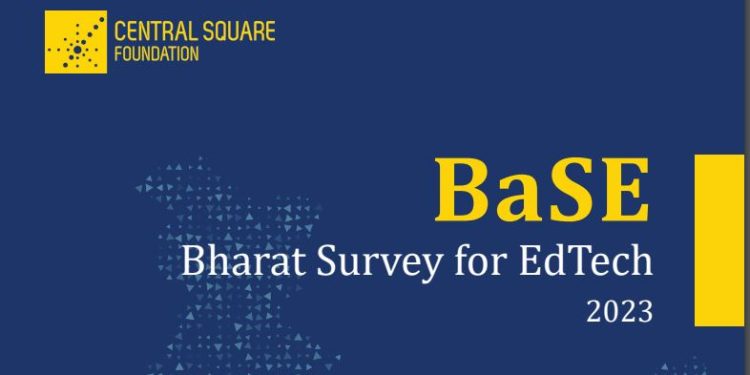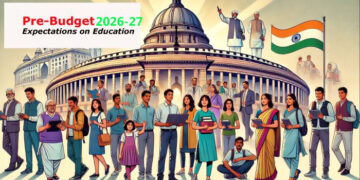The first-of-its-kind edtech household survey of low-income segments titled, ‘BaSE: Bharat Survey for EdTech’ by the Central Square Foundation (CSF), a nonprofit working in the area of quality education in school segment across India, important evidence and data has emerged on how this vast population is perceiving the sweeping shift with the Covid pandemic over the past three years—making EdTech one of the highest-funded and fastest-growing sectors in the country.
The finding and analysis of the survey validates some well-known trends and places real inputs before policy makers as well edtech ecosystem on how ‘Bharat’ (used here in context of backward and rural India) is going along the change. YouTube was found to be the most popular tool used for learning purposes (89%), followed by WhatsApp (62%) and Google (52%). Overall, the prevalence of low-tech tools was low, which included text messages (8%), TV (7%), and IVRS (7%).
Likewise, English (84%) and Mathematics (76%) were the most studied subjects using EdTech tools. Further, with increasing grades, higher usage of EdTech tools to study Science/ EVS, English, Language, Coding, and GK was reported. Middle and secondary grades had the highest proportion of present users of EdTech. A higher prevalence of present users of EdTech was noted in middle and secondary grades. In grades 9-12, 72% were present users of EdTech, followed by 55% in grades 6-8 and 39% in grades 1-5. The primary grades had the highest proportion of non-users (53%). At a gender level, no notable differences were found across types of EdTech users.
The survey was undertaken between November 2022 and January 2023, with parents and guardians of children attending government schools and affordable private schools. It covered 6030 households across 6 diverse states of India– Gujarat, Madhya Pradesh, Mizoram, Odisha, Telangana, and Uttar Pradesh. “There is a lack of comprehensive, ground-up data and reliable insights on the behaviors and needs of these users, where the need for tech-based learning is perhaps the most crucial. Consequently, both policy and EdTech solutions have not been able to address the needs and aspirations of a large section of learners. In an endeavor to bridge this information asymmetry, Central Square Foundation (CSF) has launched the first household survey, ‘BaSE: Bharat Survey for EdTech.’ It aims to amplify the voice of the end-user in Bharat and provide reliable data and insights to policymakers, educators, and tech innovators for informed decision-making in the EdTech discourse,” says the analytical report.
As per the survey, 72% of all children from all the surveyed households had access to smartphones 66% of the children had ‘shared access’ to smartphones, and 6% had ‘dedicated access ’ A higher proportion of children with ‘dedicated access’ were from rural households (7%) compared to urban households (3%). Further, children in secondary grades (16%) had greater ‘dedicated access’ to smartphones compared to middle (5%) and primary (1%) grades 5. In households where both mothers and fathers possessed a smartphone, 86% of children used their mother’s smartphone, and 23% used their father’s smartphone. 16% of the children in the households with smartphones were not using smartphones. A greater proportion of non-users were children from rural households and primary graders. The absence of the ‘need for smartphones’ was reported as the most prominent reason for the non-usage of smartphones by children (43%).
Of the children who had access to smartphones at home, more than 60% used smartphones daily. It was also found that children in secondary grades (69%) were more likely to use smartphones daily than those in primary grades (58%). Additionally, parents/guardians reported that 74% of children had more than 30 minutes of session time on smartphones on a given day, with a similar proportion of children in urban (75%) and rural (72%) households. It was also noted that children with ‘dedicated access’ spent more time on smartphones than children with ‘shared access’—62% of children with ‘dedicated access’ and 24% of children with ‘shared access’ spent more than 1 hour on the smartphone. More than half the children (53%) used EdTech because of the ‘ease of understanding of complicated topics’ enabled by EdTech tools. Other prominent reasons highlighted for the use of EdTech tools included ‘self-paced learning using EdTech’ (47%) and ‘doubt clarification’ (42%). At a state level, Gujarat and Madhya Pradesh found ‘availability of vernacular content’ most helpful (Gujarat 95%, Madhya Pradesh 59%) compared to Odisha (12%), Uttar Pradesh (8%), Telangana (5%), and Mizoram (0.3%).
‘Speed of learning’ enabled by EdTech tools was a feature that was most appreciated by the ‘present users’ of EdTech (54%). The other prominent features appreciated were ‘explanation of wrong answers or topics that a child does not understand’ (43%), ‘curriculum alignment to school’ (37%), and availability of ‘vernacular content’ (32%). Among children who were currently not using technology for learning, 61% of them cited ‘schools reopening’ after the lockdown as the most prominent reason, with rural households having cited it more (62%) compared to urban households (56%). 30% of respondents cited the availability of other learning avenues (such as tuition) as the reason for not using technology for learning.
Internet was reported to be accessible to nearly all children within households, However, around 50% of the children had intermittent access to the internet. This intermittent access was primarily due to the exhaustion of internet recharge, as reported by 93% of respondents.
Importantly, overall, 86% of the respondents reported that they were aware of technology as a medium of learning. Overall, urban households (96%) had higher awareness levels of EdTech than rural households (82%). Parents/guardians of children in secondary grades (90%) were also found to be more aware of EdTech than parents/guardians of children in primary grades (82%). 67% of all the surveyed households were inclined to advocate for EdTech. Similar to awareness of EdTech, a higher proportion of urban households (79%) compared to rural households (62%) were noted to be advocates of EdTech solutions. 11% of all the household respondents stated an intention to purchase smartphones for learning purposes ‘within the next 6 months’ of the survey. The intention to purchase smartphones was higher among parents of children in secondary grades.
After factoring sufficiency and insufficiency of in-school education, paid private tuitions, reopening etc, the authors say both policy and EdTech solutions have failed to address the needs and aspirations of a large section of learners. India’s National Education Policy (NEP) places particular emphasis on the importance of technology to improve educational outcomes. State governments are leading many tech-based interventions to enhance teaching-learning and promote access to and use of high quality Edtech solutions. In this scenario, systemic integration of edtech with school education through ICT in school education is a great pathway. “Home learning model or popularly as we call it home work coming through teachers and schools has been an integral part of our homes. The readiness for edtech is an opportunity to translate digital revolution into a learning revolution if integrated purposely. Shared or dedicated devices, research is proving children use devices/phones for a limited time which is more of less the same for studying and rest is for entertainment. So, the opportunity to increase learning inclination through edtech is really stakeholders must work on,’ says Shaveta Sharma-Kukreja, CEO & MD of Central Square Foundation .













